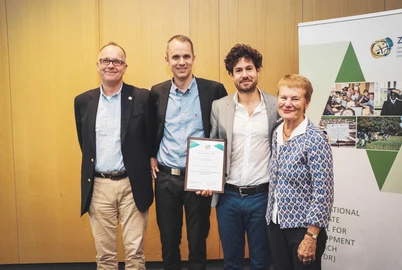Marco Elías Cisneros awarded Prize for best doctoral thesis at ZEF 2014-2017
September 19, 2018.
The Award Ceremony took place at ZEF on September 19. The Prize for the best Doctoral thesis written at ZEF is awarded every tree years by the "Friends of ZEF" association.
The laudation on behalf of the association was held by Dr. Ursula Schäfer-Preuss, former Director General of Germany’s Federal Ministry for Economic Cooperation and Development (BMZ), who praised Elías Cisneros’ dissertation for its detailed and rigorous multi-dimensional analysis which elaborates policy relevant insights into local environmental governance.
Dr. <link https: www.zef.de external-link-new-window internal link in current>Marco Elías Cisneros Tersitsch wrote his dissertation at ZEF on "<link http: hss.ulb.uni-bonn.de external-link-new-window internal link in current>The impact of public policies on deforestation in the Brazilian Amazon". He obtained his doctoral degree in March 2017 with highest praise. His research was funded by the <link https: www.bosch-stiftung.de de external-link-new-window internal link in current>Robert-Bosch-Foundation.
In his speech, the awardee shared his personal view on the role of a scientist in society and the hardship of conducting thorough and honest research:
"I would advocate that a scientist contribution to stable social institutions is to produce thorough analyses, […] collaborate, credit your colleagues wherever possible, and sometimes bluntly state the uncomfortable truth […] Being truthful takes time. Let me thank here everybody at ZEF for giving me the liberty to take my time [...] and the opportunity to develop”, Cisneros said.
He pointed out that Brazil's success in reducing deforestation rates (which fell between 2004-2012 by 80%) is attributed to its paradigm shift towards coordinated environmental conservation efforts.
"During the 2000s the protected areas network expanded, a live satellite monitoring system was implemented and the environmental law enforcement agency received more funds. For the first time it was possible to actually detect and prosecute environmental offenders. Later on, land registration efforts were boosted and credit restrictions to environmental offenders were implemented. Finally, also public-private partnerships emerged, such as the soy and beef moratoria, where retailers agreed not to buy products from previously deforested areas."
In his research he analyses the influence, which local governance has on environmental outcomes:
"As these [federal conservation] policies have an effectiveness that ranges from very low to very high, it seems evident that policy implementation depends on the local context. Especially on the local political context which can either support federal policy instruments or hinder these."
He continued: "Three studies helped me to understand some of the mechanisms at the local level: First, I studied how an anti-corruption program impacted deforestation. [..] My second study focused on Brazil’s most experimental policy: A cross-compliance mechanism that consisted of publishing a so-called ‘blacklist’ of the 50 most deforesting municipalities. […] In the third part of my thesis, I studied the governance of protected areas by analysing a Payment for Environmental Services program (combined with some development aspects) which is implemented in some protected areas."
Cisneros concluded his research by stating: "[…] deforestation is strongly associated with corruption at the local level. A fight against corruption should therefore not only scrutinize public service delivery but also environmental outcomes. Politicians react to incentives. This means they will only perform better where they are controlled or where the public is exercising pressure. That is why the 'naming and shaming' strategy was effective in Brazil: Politicians started to be concerned of losing investments and market demand. Thereby it was possible to influence environmental governance at the local level and motivate local stakeholders to create environmental initiatives."
Marco Elías Cisneros Tersitsch recently joined the <link https: www.uni-goettingen.de de external-link-new-window internal link in current>Georg-August-University Göttingen, working for the Collaborative Research Centre 990: Ecological and Socioeconomic Functions of Tropical Lowland Rainforest Transformation Systems, where he focuses now on the political economy of deforestation in Indonesia.



